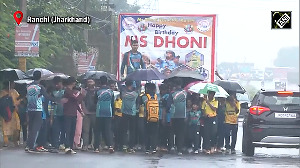One of the most painfully funny sights I see most mornings is a fat little boy in a smart starched uniform waddling past my house to his school followed by a ragged child, smaller and much thinner than him, carrying his bag of books and flask of drinking water.
They are, to adapt the title of Jeffrey Archer's last thriller, Prisoners of Birth. They also poignantly illustrate the tragedy that the Central Board of Secondary Education hopes to alleviate.But it's a catch-22 situation.
Idealism can run away with practical sense. India notoriously enjoys the distinction of having the world's largest number of child workers, estimates varying between 60 and 115 million, though the 2001 census mentioned only 12.6 million.
I can hear the young voices intoning dutifully, "I promise that I will not allow children to work in my house." Then what?
Suppose the fat little boy I mentioned tells his parents that the ragged little servant is unnecessary for he himself will carry his bag and water flask to school which would be highly commendable.
But the question arises, What then? The parents will find other work at home for the child servant, and it's likely to be harder labour than trotting to school every day behind a pampered boy. If the parents pay money or even provide food and lodging, they will expect a return and will put the child servant to sweeping and swabbing, washing clothes, scouring pots and pans and constantly running errands. Or they will sack him. If this is replicated, and more infants in the 9,600 affiliated schools are inspired to act on the CBSE circular, lakhs of young domestic servants will be affected.That brings me to the most ominous "What then?" of all. What will happen to the millions of young workers who can't afford school if they are thrown out of jobs? What will happen to their parents and siblings who depend on their meagre earnings for survival?
This is not a plea for exploiting the young. We were all shamed by American Labour Secretary Robert Reich's critical report, By the Sweat and Toil of Children, just as we had earlier been inspired by Jawaharlal Nehru's declaration that there were no orphans in India because they were all children of Mother India. But we knew, too, that she can be a cruel mother.
Mira Nair's film, Salaam Bombay!, movingly highlighted how cruel.Kailash Satyarthi justifiably won the Robert Kennedy Human Rights Award with his crusade for carpets to carry a label saying they had not been made by children. But it's not just carpets. Cigarette rolling, match-making, beads also employ the young. Bonded children work in the fields. Expectedly, Dalits fare worst.
The law cannot do anything about it mainly because need is the most powerful motivation.
A number of worthy social welfare organisations do try to rescue victims of trafficking and exploitation, see them through school, provide accommodation, food and clothes, and train them for some useful vocation. But as the recent BBC report on the findings of an NGO called Equations on boys being sexually abused in the temple towns of Puri, Thirupathi and Guruvayoor confirmed, these efforts are a drop in the ocean of India's distress and desperation.There is no short-cut solution to this complex problem.
Heart-rending though it be, the abuse will continue until general economic growth raises the living standard of low-income families (which, in India, usually also means low caste) so that parents can forgo their children's earnings.
Meanwhile, stricter application of legal provisions should reduce working hours and improve working conditions to eliminate health hazards.
Wider provision of free compulsory part-time schooling, constant supervision and appeals such as the one launched by the CBSE might help to blunt the more harsh edges of exploitation.







